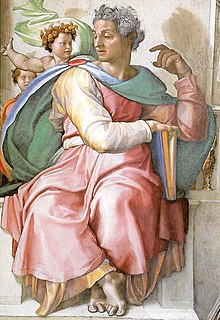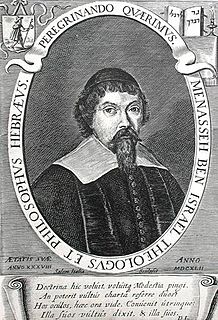Related Research Articles

The Book of Kings is the ninth book of the Hebrew Bible or the eleventh and twelfth books of the Christian Old Testament. It concludes the Deuteronomistic history, a history of Israel also comprising the books of Joshua and Judges and the Book of Samuel, which biblical commentators believe was written to provide a theological explanation for the destruction of the Kingdom of Judah by Babylon in c. 586 BCE and a foundation for a return from exile. The two books of Kings present a history of ancient Israel and Judah from the death of King David to the release of Jehoiachin from imprisonment in Babylon, a period of some 400 years. Scholars tend to treat the books as made up of a first edition from the late 7th century BCE and a second and final edition from the mid 6th century BCE.

Hezekiah, or Ezekias, was, according to the Hebrew Bible, the son of Ahaz and the 13th king of Judah. He is considered a very righteous king in both the Second Book of Kings and the Second Book of Chronicles. He is also one of the more prominent kings of Judah mentioned in the Bible and is one of the kings mentioned in the genealogy of Jesus in the Gospel of Matthew. "No king of Judah, among either his predecessors or his successors, could ... be compared to him", according to 2 Kings 18:5.

Isaiah was the 8th-century BC Israelite prophet after whom the Book of Isaiah is named.

According to the Hebrew Bible, the Kingdom of Israel, was one of two successor states to the former United Kingdom of Israel and Judah. Historians often refer to the Kingdom of Israel as the "Northern Kingdom" or as the "Kingdom of Samaria" to differentiate it from the Southern Kingdom of Judah.

The Old Testament is the first part of the Christian biblical canon, which is based primarily upon the twenty-four books of the Hebrew Bible, a collection of ancient religious Hebrew writings by the Israelites believed by most Christians and religious Jews to be the sacred Word of God. The second part of Christian Bibles is the New Testament, written in the Koine Greek language.

Nevi'im is the second main division of the Hebrew Bible, between the Torah (instruction) and Ketuvim (writings). The Nevi'im are divided into two groups. The Former Prophets consists of the narrative books of Joshua, Judges, Samuel and Kings; while the Latter Prophets include the books of Isaiah, Jeremiah, Ezekiel, and the Twelve Minor Prophets.

According to the Hebrew Bible, the Tribe of Ephraim was one of the Tribes of Israel. The Tribe of Manasseh together with Ephraim formed the House of Joseph. It is one of the ten lost tribes. The etymology of the name is disputed.
According to the Hebrew Bible, the Tribe of Manasseh was one of the Tribes of Israel. It is one of the ten lost tribes. Together with the Tribe of Ephraim, Manasseh also formed the House of Joseph.

Ephraim was, according to the Book of Genesis, the second son of Joseph and Asenath. Asenath was an Egyptian woman whom Pharaoh gave to Joseph as wife, and the daughter of Potipherah, a priest of On. Ephraim was born in Egypt before the arrival of the children of Israel from Canaan.

Manasseh was the fourteenth king of the Kingdom of Judah. He was the oldest of the sons of Hezekiah and his mother Hephzibah. He became king at the age of 12 and reigned for 55 years.

Josiah or Yoshiyahu was the sixteenth king of Judah who, according to the Hebrew Bible, instituted major religious reforms. Josiah is credited by most biblical scholars with having established or compiled important Hebrew scriptures during the "Deuteronomic reform" which probably occurred during his rule. Josiah became king of the Kingdom of Judah at the age of eight, after the assassination of his father, King Amon. Josiah reigned for thirty-one years, from 641/640 to 610/609 BCE.

The Prayer of Manasseh is a short work of 15 verses recording a penitential prayer attributed to king Manasseh of Judah. The majority of scholars believe that the Prayer of Manasseh was written in Greek in the first or second century BC. Another work by the same title, written in Hebrew and containing distinctly different content, was found among the Dead Sea Scrolls.

Manoel Dias Soeiro, better known by his Hebrew name Menasseh ben Israel, also, Menasheh ben Yossef ben Yisrael, also known with the Hebrew acronym, MB"Y, was a Portuguese rabbi, kabbalist, writer, diplomat, printer and publisher, founder of the first Hebrew printing press in Amsterdam in 1626.
The non-canonical books referenced in the Bible includes pseudepigrapha, writings from Hellenistic and other non-Biblical cultures, and lost works of known or unknown status. By the "Bible" is meant those books recognised by most Christians and Jews as being part of Old Testament as well as those recognised by Christians alone as being part of the Biblical apocrypha or of the Deuterocanon.

The biblical apocrypha denotes the collection of apocryphal ancient books thought to have been written some time between 200 BC and 400 AD. Most Christian Churches include some or all of the same texts within the body of their version of the Old Testament.
The Chronicles of the Kings of Israel is a book that gives a more detailed account of the reigns of the kings of ancient Kingdom of Israel than that presented in the Hebrew Bible, and may have been the source from which parts of the biblical account were drawn. The book was likely compiled by or derived from the kings of Israel's own scribes, and is likely the source for the basic facts presented in the Bible.
The Chronicles of the Kings of Judah is a Lost work that gives a more detailed account of the reigns of the kings of the ancient Kingdom of Judah that appears in the Hebrew Bible. It is not believed to be Books of Chronicles since it is implied by the writer of Books of Kings that it could be used as a significant supplement to the writings contained in that book itself and Books of Chronicles adds little information at best and there is also a discrepancy in the dates of certain events between the two books.
The Book of the Kings of Judah and Israel was separated into the two books of I Kings and II Kings in the Old Testament. The book is described at 2 Chronicles 16:11. The passage reads: "And, behold, the acts of Asa, first and last, lo, they are written in the book of the kings of Judah and Israel." It is also referenced at 2 Chronicles 24:27; "The account of his sons, the many prophecies about him, and the record of the restoration of the temple of God are written in the annotations on the book of the kings. And Amaziah his son succeeded him as king."

According to the Hebrew Bible, Phinehas or Phineas was a priest during the Israelites’ Exodus journey. The grandson of Aaron and son of Eleazar, the High Priests, he distinguished himself as a youth at Shittim with his zeal against the heresy of Peor. Displeased with the immorality with which the Moabites and Midianites had successfully tempted the Israelites to inter-marry and to worship Baal-peor, Phinehas personally executed an Israelite man and a Midianite woman while they were together in the man's tent, running a javelin or spear through the man and the belly of the woman, bringing to an end the plague sent by God to punish the Israelites for sexually intermingling with the Midianites.

The Assyrian captivity is the period in the history of Ancient Israel and Judah during which several thousand Israelites of ancient Samaria were resettled as captives by Assyria. This is one of the many instances of forcible relocations implemented by the Neo-Assyrian Empire. The Northern Kingdom of Israel was conquered by the Neo-Assyrian monarchs, Tiglath-Pileser III (Pul) and Shalmaneser V. The later Assyrian rulers Sargon II and his son and successor, Sennacherib, were responsible for finishing the twenty-year demise of Israel's northern ten-tribe kingdom, although they did not overtake the Southern Kingdom. Jerusalem was besieged, but not taken. The tribes forcibly resettled by Assyria later became known as the Ten Lost Tribes.
References
- ↑ LOST BOOKS OF THE BIBLE? Archived 2006-06-23 at the Wayback Machine
This article needs additional citations for verification .(July 2007) (Learn how and when to remove this template message) |
| This article about a book related to Christianity is a stub. You can help Wikipedia by expanding it. |
| This article related to the Hebrew Bible is a stub. You can help Wikipedia by expanding it. |
| This article about a Judaism-related book or text is a stub. You can help Wikipedia by expanding it. |